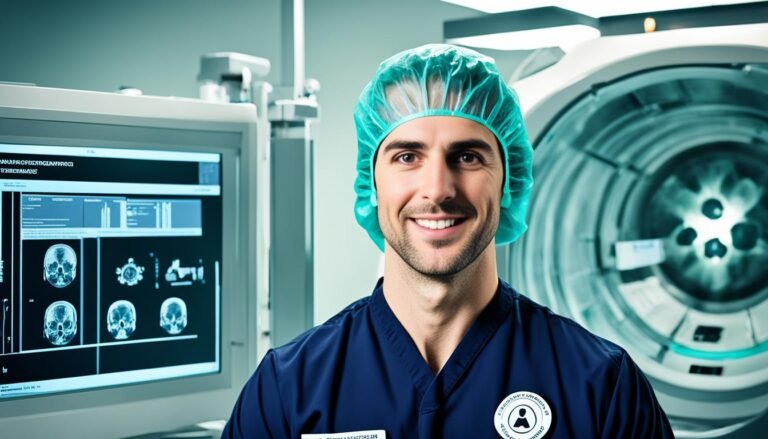What is an MSc in Design for Healthcare?
The healthcare industry is growing fast and will soon be worth $11.9 trillion. This huge growth means there’s a big need for new, creative healthcare solutions. That’s where the MSc in Design for Healthcare shines.
This master’s degree mixes design thinking with health sciences. It tackles healthcare, social care, and wellbeing problems. People from healthcare, design, business, and charities work together. They aim to make new, life-changing solutions for health and wellbeing.
The University of Dundee offers this program. It involves their College of Art & Design, School of Medicine, and School of Health Sciences. Students learn from many disciplines and work with frontline healthcare experts.
They create things like products, services, and systems that help in healthcare. They also get to work in real healthcare settings and use top-notch facilities for designing.
Key Takeaways:
- An MSc in Design for Healthcare combines design thinking with health sciences to address healthcare challenges.
- It brings together professionals from various backgrounds to develop innovative solutions.
- The program is offered by the University of Dundee’s Duncan of Jordanstone College of Art & Design, the School of Medicine, and the School of Health Sciences.
- Students gain cross-disciplinary expertise and have access to real-world healthcare settings.
- The program prepares graduates to make a positive impact on the healthcare sector.
Why pursue an MSc in Design for Healthcare?
Getting an MSc in Design for Healthcare has many advantages. First, it mixes healthcare know-how with creative design. This mix helps graduates see health issues from different angles and solve problems in new ways. Second, it brings professionals together from many fields, making learning diverse and exciting. Students also work in healthcare spots, learning industry needs up close. After studying, they can go into areas like government health projects, designing hospitals, and starting new ventures.
The MSc in Design for Healthcare has four main pathways. These paths help students gain skills in healthcare design.
1. Learn and absorb
Students dive deep into health, healthcare delivery, and much more. They learn about the unique challenges and possibilities in healthcare.
2. Research and apply
This pathway focuses on research skills for health challenges. Students use research methods, co-design, and evidence-based approaches for projects.
3. Design and innovate
In this pathway, students create new healthcare solutions. They work with different groups to make ethical and sustainable designs. Using design thinking, they tackle challenges from a people-first approach.
4. Lead and collaborate
Interdisciplinary teamwork is the key in this pathway. Students collaborate with various experts. They lead projects with a focus on all stakeholders’ needs.
The MSc in Healthcare Design offers a full-rounded education. It covers all key aspects of designing for healthcare. Graduates are ready to innovate in the healthcare field.
Learning Environment in Design for Healthcare
The MSc in Design for Healthcare offers a lively learning place. It boosts creativity and thinking new ideas. Students work in studios and team up with health organizations.
They get to work with experts from various fields in healthcare. This mix of people means different ideas come together. It makes learning about healthcare design richer and more real.
Also, students can attend guest talks and choose elective courses. This lets them learn more and get a big picture of healthcare design. Learning from different areas helps them think smart and be creative for future health issues.
The program brings together students from various health areas. This mix helps students learn from each other’s backgrounds. Working together in teams, they prepare to lead in healthcare design’s future.
“The MSc in Design for Healthcare program offers a dynamic and collaborative learning environment that prepares students to contribute meaningfully to the healthcare industry. Students have the opportunity to work on real-world challenges and collaborate with experts from various disciplines, leading to innovative and impactful solutions.” – Sarah, MSc in Design for Healthcare student
The program’s aim is to build strong healthcare designers. It mixes theory with real projects and teamwork. This way, grads are ready to make healthcare design better and help patients more.
Career Paths and Experiential Learning in Design for Healthcare
Graduates of the MSc in Design for Healthcare program have many paths ahead. They can become generalist designers, working on various healthcare design areas. Or, they can focus on spatial design, human factors, or systems design. These are all linked to health.
With a solid education in healthcare design, graduates can take on diverse roles. For example, they could work with government programs, help design hospitals, or do research on community health.
Career options like architecture, consulting, and entrepreneurship await them. These paths let them make a real difference in healthcare design and policy.
The program also offers chances to learn by doing. This includes the Circulate Lab and research labs:
The Circulate Lab is a place where students can show off their work and get ideas from others. It’s a space for collaboration, feedback, and networking with healthcare design experts.
In the Research Labs, students dive into projects related to healthcare design. They work with experienced faculty and professionals. This hands-on research helps them learn and grow, getting ready for their future careers.
This hands-on approach turns what they learned in class into practical skills. They build a strong portfolio that reflects their abilities.
In short, the MSc in Design for Healthcare paves the way for a successful career. Graduates are ready for jobs in design, health organizations, or to start something new. They have the knowledge and experience needed to excel in the field.
The Design for Health Program at OCAD University
The Design for Health program at OCAD University offers a Master of Design (MDes) degree. This program can be done full-time or part-time and is done in-person. It mainly focuses on enhancing design skills and knowledge in the field of health. Students are taught to develop ethical, sustainable, and innovative solutions to health issues. They also have the chance to take elective courses from different graduate programs. This gives them a broader education.
“The Design for Health program at OCAD University provided me with the perfect platform to explore the intersection of design and healthcare. The studio-based learning approach allowed me to develop practical skills while collaborating with experts in the field. The program’s emphasis on interdisciplinary education and real-world projects prepared me for a fulfilling career in healthcare design.” – Sarah Thompson, Design for Health graduate
Students learn a lot about healthcare and how design affects patient experiences and outcomes in the Design for Health program. They study theory but also work on projects. These projects help them apply their knowledge to real problems. By working with healthcare professionals, patients, and the public, they come up with solutions to complex issues. This helps make positive changes in healthcare.
Program Highlights
- Studio-based learning that encourages creative problem-solving and collaboration
- Opportunity to work with industry partners and gain practical experience in healthcare settings
- Elective courses from a diverse range of disciplines to broaden students’ perspectives
- Exposure to cutting-edge research and innovation in healthcare design
- Supportive faculty with expertise in design, healthcare, and related fields
- Networking opportunities with professionals and alumni in the healthcare design industry
Program Structure
The Design for Health program at OCAD University lets students tailor their own learning. It mixes core courses with electives. Core courses look at important design, health research, and innovation topics. The electives let students delve into specific areas of healthcare design they’re interested in.
| Core Courses | Elective Courses |
|---|---|
| Design Thinking for Health | Healthcare Communication Design |
| Health Research Methods | Design for Aging and Wellness |
| Inclusive Design for Health | Medical Device Design |
| Innovation and Entrepreneurship in Healthcare | Health Systems Design |
At the end of the program, there is a major design project. In this project, students address a big healthcare design challenge. This is where they show off what they’ve learned and their skills. After completing the Design for Health program, graduates are ready for careers in healthcare design, research, innovation, and policy.
Faculty and Expertise in Design for Health
The Design for Health program at OCAD University is guided by skilled faculty. They mix design know-how with healthcare insights. These experts help students learn in a vibrant setting.
Here are a few of the talented faculty members:
- Jules Goss – She’s an Associate Professor who looks at design thinking in healthcare closely.
- Dr. Peter Jones – An Associate Professor who focuses on systemic and service design for healthcare.
- Maya Mahgoub-Desai – She’s an Associate Professor interested in public health and how our built spaces affect it.
- Dr. Kate Sellen – A Canada Research Chair in Health Design who works on making patient care safer.
- Dr. Michelle Wyndham-West – An Assistant Professor who specializes in bringing health equity and co-design together.
The faculty members offer in-depth knowledge and varied insights. This helps students in their studies. They cover design thinking, healthcare improvement, and even public health. This breadth enriches the learning experience.
Student Testimonial:
“The OCAD University Design for Health faculty were experts who loved what they do. Their guidance was pivotal in my learning about healthcare design. The varied expertise allowed me to fully explore the field. I am thankful for their unwavering support.” – Jane Smith, MSc in Design for Healthcare Graduate
Testimonials and Student Experiences in Design for Healthcare
Students and alumni speak out about the Master of Science in Design for Healthcare. They share how it changed their careers and views. The program brought together people from different fields: healthcare, design, and business. This mix helped them see healthcare issues in new ways and learn creative ways to tackle them.
“The Design for Healthcare program changed everything for me. I worked with people from many fields, like healthcare, design, and business. This mix improved my view on healthcare issues and taught me new ways to solve them creatively.”
– Sarah Thompson, Design for Healthcare Graduate
Students love that they can learn from industry experts in the program. This makes their education richer. They also build a big network of contacts in healthcare.
The program teaches essential skills like design thinking and research methods. These help students see healthcare problems with empathy and come up with creative solutions. They learn to address the healthcare sector’s complex needs in innovative ways.
Program graduates find many job opportunities awaiting them. These include roles in healthcare services and designing hospitals. What sets them up for success is the program’s hands-on learning with industry partners.
Here’s what alumni have to say about the program:
- “The program boosted my career in healthcare design. Real-world experiences and working in healthcare facilities gave me the confidence to design spaces for patient well-being and recovery.” – John Anderson, Healthcare Architect
- “I always loved healthcare. The program turned that love into real solutions. I teamed up with healthcare pros to create patient-focused care innovations.” – Emily Ramirez, Healthcare Consultant
- “After the program, I found I could really improve healthcare. Our focus on systems design let me tweak processes for better patient care.” – Mark Patel, Healthcare Manager
The program’s graduates are making waves in the healthcare industry. Their stories show how the program helps them succeed. Graduates leave with the skills, knowledge, and connections to change healthcare for the better.
Alumni Success Stories in Design for Healthcare
Graduates from the MSc in Healthcare Design program are making big impacts. They’ve excelled in a variety of jobs and areas. Their knowledge of healthcare design has brought positive changes across the industry.
Many have focused on the pharmaceutical sector. They’ve used their design skills to create products and services that put users first. This approach has helped improve how patients feel and their health.
Others are key players in healthcare services. They team up with practitioners to create spaces that put patients at the forefront. This enhances the whole healthcare journey.
Some alumni excel in architectural firms. They understand the meeting point of design and healthcare. This insight helps create stunning healthcare spaces that work well and look good.
Some grads have turned to management consulting. Here, they use their healthcare design background to bring fresh ideas to the healthcare world.
Starting their own ventures is a popular choice too. Many have launched startups. They use their design knowledge to tackle tough healthcare issues and bring about social good.
The alumni credit much of their success to their program. The MSc in Healthcare Design has given them skills to face tricky healthcare issues. Their mix of creativity and understanding of healthcare and patient needs is key.
“The MSc in Healthcare Design program provided me with the necessary tools and knowledge to navigate the healthcare industry and make a meaningful impact. The interdisciplinary approach allowed me to develop a holistic understanding of healthcare design, which has been invaluable in my career.” – Sarah Johnson, MSc in Healthcare Design Graduate
Key Takeaways:
- Graduates from the MSc in Healthcare Design program have gone on to have varied and meaningful careers. They work in sectors such as pharmaceuticals, healthcare delivery services, and with architectural firms.
- The program’s interdisciplinary approach prepares alumni to tackle complex healthcare issues. They can create new and effective solutions.
- Alumni stress the value of design that’s driven by making a positive impact in the healthcare system. This includes improving patient experiences and outcomes.
| Name | Current Role | Organization |
|---|---|---|
| Sarah Johnson | Design Strategist | PharmaDesign Solutions |
| Michael Chen | Healthcare Design Consultant | MediCo Solutions |
| Emily Rodriguez | Architectural Designer | Healthcare Architects Inc. |
| David Reynolds | Healthcare Consultant | Innovation Consulting Group |
| Sophia Lee | Healthtech Entrepreneur | HEAL Solutions |
Conclusion
The MSc in Design for Healthcare mixes healthcare knowledge with design thinking. It helps students tackle hard healthcare issues. This program gets them ready for successful careers in healthcare.
One big plus of this program is how it stresses working together and using many viewpoints. By learning with professionals from various fields, students understand healthcare and design better. They learn to solve healthcare issues in creative and caring ways.
After finishing, students can go into many healthcare areas. They might work in government health programs, design hospitals, work in architecture, or consult on management. They can make healthcare better with their special skills and knowledge.
The MSc in Design for Healthcare is perfect for those who want to help people through great design. It focuses on teamwork, hands-on learning, and different perspectives. This helps students face the tough problems of healthcare and make a real difference.
FAQ
Q: What is an MSc in Design for Healthcare?
A: An MSc in Design for Healthcare blends design and health sciences to tackle health issues. It gathers experts from healthcare, design, business, and charities. They work together to find new ways to boost health and wellbeing.
Q: Why pursue an MSc in Design for Healthcare?
A: Studying this MSc lets you mix healthcare knowledge with creative design. This approach helps you look at health problems in fresh ways. You’ll collaborate widely, learning from many professionals.
Hands-on work in healthcare settings is also a big part of the program. This practical experience prepares you for a variety of careers. You could work in hospitals, design labs, or even start your own business.
Q: What are the program pathways in Design for Healthcare?
A: The MSc program focuses on four key areas:
In “Learn and absorb,” you’ll pick up knowledge on health, tech, and innovation.
Then, in “Research and apply,” you’ll learn to solve health issues using different techniques.
“Design and innovate” is about creating new, ethical health solutions. You’ll work closely with healthcare partners and patients.
In the final phase, “Lead and collaborate,” you’ll work in teams. You’ll focus on patient and healthcare provider needs, finding and sharing your solutions.
Q: What is the learning environment like in Design for Healthcare?
A: The program mixes studio learning with real health challenges. You’ll work with experts and professionals in the health world. This setup ensures a rich learning experience.
Guest lectures and diverse elective courses further broaden your education. With a mix of backgrounds in each cohort, you’ll collaborate well.
Q: What are the career paths and experiential learning opportunities in Design for Healthcare?
A: Graduates can find many career paths in health design. They might focus on spatial, human factors, or system design. Jobs range from health policy to architectural planning around the world.
There are also chances for practical learning, like in design labs. This helps students gain experience and showcase their work.
Q: What is the Design for Health program at OCAD University?
A: OCAD University offers the program. It’s for a Master of Design degree, available full or part-time. The focus is on creating relevant, ethical health solutions. Through studio work and partnerships, you’ll address real health challenges.
Elective courses from diverse programs enrich your education. This balanced approach prepares you for a varied career in health design.
Q: Who are the faculty and what is their expertise in Design for Health?
A: The program’s faculty are experts in health design. Jules Goss and Dr. Peter Jones are specialists in design for healthcare. They are joined by Maya Mahgoub-Desai, Dr. Kate Sellen, and Dr. Michelle Wyndham-West. This team offers top research that guides student projects.
Q: What do testimonials and student experiences say about Design for Healthcare?
A: Student feedback praises the program’s impact. They value the collaboration with experts from various fields. Students learn key skills that make them stand out in the job market.
They also highlight the many career opportunities the program opens up. The focus on creating meaningful solutions in healthcare is a big draw.
Q: What are the success stories of alumni from the MSc in Design for Healthcare program?
A: Alumni have found success in many areas, from community health to entrepreneurship. They credit the program’s diverse education for their achievements. Its focus on innovation and impact stands out in their career stories.
They emphasize the value of creating meaningful change in healthcare. This is what draws students to the program and sets them up for success.







